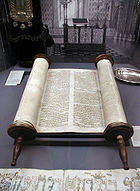- Book of Obadiah
-
- For the attributed author of the Book of Obadiah, see Obadiah.
The canonical Book of Obadiah is an oracle concerning the divine judgment of Edom and the restoration of Israel.[1] The text consists of a single chapter, divided into 21 verses, making it the shortest book in the Hebrew Bible.[2]
In Judaism and Christianity, its authorship is attributed to a prophet who lived in the Assyrian Period, Obadiah, whose name means “servant or worshipper of Yahweh”.
In Christianity, the book of Obadiah is classified as a minor prophet of the Old Testament, due to its short length.
In Judaism, Obadiah is considered a “later prophet” and this Masoretic Text is chronologically placed in the Tanakh under the section Nevi'im in the last category called The Twelve Prophets.
Contents
Content
Part of a series on The Hebrew Bible
and DeuterocanonGenesis · Exodus · Leviticus · Numbers
Deuteronomy · Joshua · Judges · Ruth
1–2 Samuel · 1–2 Kings · 1–2 Chronicles
Ezra · Nehemiah · Esther · Job · Psalms
Proverbs · Ecclesiastes · Song of Songs
Isaiah · Jeremiah · Lamentations
Ezekiel · Daniel · Minor prophetsTobit · Judith · 1–2 Maccabees
Wisdom (of Solomon) · Sirach
Baruch · Letter of Jeremiah
Additions to Daniel / to Esther Bible portal
Bible portalThe book of Obadiah is based on a prophetic vision concerning the fall of Edom,[v.1,4,18] a mountain dwelling nation[v.8,9,19,21] whose Founding Father was Esau.[v.6] Obadiah describes an encounter with God who addresses Edom’s arrogance and charges them for their violent actions against their brother nation, the House of Jacob.[v.10]
The vision then embraces the fall of Jerusalem to the hands of foreign invaders and God’s anger against Edom for taking advantage of the Jews of Judah during their plight, thus sealing their doom.[v.10-14]
In the final aspect of the vision, Israel’s restoration, as a holy place, is declared in contrast to the Edomite lineage that shall end. Obadiah’s prophecy also includes a reminder that God’s judgment will be upon all nations. “For the day of the Lord upon all the nations is near… But on Mount Zion there shall be deliverance” [NKJ v.15, 17]
Scholarly Issues
Dating Obadiah
The date of composition is disputed and is difficult to determine due to the lack of personal information about Obadiah, his family, and his historical milieux. The date of composition must therefore be determined based on the prophecy itself. Edom is to be destroyed due to its lack of defense for its brother nation, Israel, when it was under attack. There are two major historical contexts within which the Edomites could have committed such an act. These are during 853 – 841 BC when Jerusalem was invaded by Philistines and Arabs during the reign of Jehoram (recorded in 2 Kings 8:20-22 and 2 Chronicles 21:8-20 in the Christian Old Testament) and 605 – 586 BC when Jerusalem was attacked by King Nebuchadnezzer of Babylon, which led to the Babylonian exile of Israel (recorded in Psalm 137). The earlier period would place Obadiah as a contemporary of the prophet Elijah as reflected in 1 Kings, Chapter 18, Verses 1-16. In particular, 1 Kings 18:7-8 reads: And as Obadiah was in the way, behold, Elijah met him: and he knew him, and fell on his face, and said, Art thou that my lord Elijah? And he answered him, I am: go, tell thy lord, Behold, Elijah is here.
The later date would place Obadiah as a contemporary of the prophet Jeremiah, both of whom were prophets in the respective time periods. The later period appears to be the scholarly consensus[citation needed] as Obadiah 1-9 parallels Jeremiah 49:7-22. The passage in Jeremiah dates from the fourth year of the reign of Jehoiakim (604 BC), and therefore Obadiah 11-14 seems to refer to the destruction of Jerusalem by Nebuchadnezzer (586 BC). It is more likely[citation needed] that Obadiah and Jeremiah together were drawing on a common source presently unknown to us than Jeremiah drawing on previous writings of Obadiah as his source. There is also much material found in Obadiah 10-21 which Jeremiah does not quote, and which, had he had it laid out before him, would have suited his purpose admirably. Despite everything, however, there are some[citation needed] who support both dates and even some[citation needed] who support dates other than the two major possibilities presented. Any date for the composition of Obadiah must be held tentatively.
Contrast to Amos
In verse eighteen, it says that once judgment has been carried out, “There will be no survivors from the house of Esau” (NIV). So, according to Obadiah there will not remain even a remnant after Edom’s judgment; This is in contrast to Amos 9:12, where Amos refers to such a remnant, however, it is stated that their possession will be given to Israel. Some scholars have suggested that Amos’s reference to Edom is symbolic of all nations who were once enemies of Israel and not meant to literally mean Edomites in the flesh. This is certainly the perspective of Luke as he recites the passage from Amos in Acts 15:17. Edom is symbolic of the remnant of men and Gentiles who will eventually bear God’s name. Moreover, Frederick A. Tatford in Prophet of Edom’s Doom says that Obadiah’s prophecy is fulfilled today as there is currently no trace of anyone who may be identified as an Edomite.
Sepharad
See main article: Sepharad
The identity of the land of Sepharad, mentioned only here in this verse in the bible, Obadiah 1:20, is currently unknown. It is also unknown whether or not Sepharad is a city, district or territory. The only clues for its possible existence are Persian inscriptions that refer to two places called "Saparda": one area in Media and another in Asia Minor, debated to be Sardis.
Zarepath
The land of Zarephath, also mentioned in verse twenty, is speculated to be Sarepta. It is interesting to note that in Rabbinical and modern Hebrew, the name Zarepath is used to refer to France. There is some debate over the application of this name to a European land, because of Rabbinic literature identifying Edom with the Roman Empire. However, there is no historical evidence to even suggest the existence of any Jewish colonies or captives, in that European region, during the Assyrian Period of Obadiah's day.
Scriptural Parallels
The exact expression "the Day of the Lord”, from Obadiah 1:15, has been used by other authors throughout the Old and New Testaments, as follows:
- Isaiah 2, 13, 34, 58, Jeremiah 46:10, Lamentations 2:22, Ezekiel 13:5, Joel 1, 2, 3, Amos 5:18, 20, Zephaniah 1, 2, Zechariah 14:1, Malachi 4:5
- 1 Thessalonians 5:2, 2 Peter 3:10, Acts 2:20, 1 Corinthians 5:5, 2 Corinthians 1:14
For other parallels, compare Obadiah 1:1-8 with Jeremiah 49:7-16.
Christian View
The overwhelming theme found in Obadiah is the destruction of enemies of God’s people. Unlike other prophets, Obadiah does not present a “turn or burn” message, simply a message of inevitable doom as a consequence of previous actions. A Christian with a knowledge of the New Testament of the Bible would say that although God’s grace and forgiveness abound in situations, there are consequences which result from bad decisions. Obadiah shows that judgment falls even within the family of God, as Israel and Edom descended from twin brothers, Jacob and Esau. His purpose[citation needed] was to make it known that according to his God, if members of the same family were to treat each other in the same manner as Edom treated the Israelites, they too may be subject to the wrath of God.
There is a second theme which lies under the surface of Obadiah's writing which may be relevant for Christians as a faith group. Just as there is perpetual conflict between the two nations of Israel and Edom who once struggled together within a single womb, Christians may understand from New Testament teaching that there is a similar conflict found within their very lives. Paul’s Epistle to the Galatians in the New Testament presents the idea that the spirit of God and the flesh are in a continual struggle within a person (cf. Romans 8:6-9, Colossians 3:5), just like the two nations in Obadiah’s prophecy. Either the spirit or the flesh will ultimately overcome and the other will fail (just as Israel overcame and Edom failed). It is the Christian perspective that the spirit will ultimately prevail in the resurrection of the dead (e.g. Romans 8:23) with the coming of a renewed heavens and earth ( e.g. 2Peter 3:13).
In relating to theme of Obadiah, it is important to underscore the “punishment” theme this book outlines against Edom. W.J. Deane and J.R. Thomson write this valid conclusion, “The Book of Obadiah is occupied with one subject – the punishment of Edom for its cruel and unbrotherly love conduct towards Judah...” [3] One can link this idea of punishment to one of the major prophets “Ezekiel” who “...interprets the exile to Babylon and the destruction of Jerusalem as deserved punishments for the sins of those who themselves committed them.” [4] Verses 3-7 [1] in Obadiah explain to the reader the reason for the punishment theme, “Confidence in one’s power, intelligence, allies, or the topographical features of one’s territory is often mentioned as an attribute of those who foolishly confront the Lord and are consequently punished.” [5] Although destruction is vital to understanding Obadiah, it is of note to understand the destruction being a consequence of action.
See also
Books of Nevi'im (Hebrew Bible) First Prophets 1. Joshua 2. Judges 3. Samuel 4. Kings Later Prophets 5. Isaiah 6. Jeremiah 7. Ezekiel 8. 12 minor prophets - Teman [v.9]
- The lowland of Philistia [v.19]
- The fields of Ephraim [v.19]
- The fields of Samaria [v.19]
- The land of Gilead [v.19]
References
- ^ Coogan, M.“A Brief Introduction to the Old Testament: The Hebrew Bible in its Context. Oxford University Press, New York (2009) p. 315
- ^ Nelson's Compact Illustrated Bible Dictionary, Thomas Nelson Publishers, 1978, p. 191, ISBN 0840756364
- ^ Deane, W.J. & Thomson, J.R., The Book of Obadiah, The Pulpit Commentary, Vol. 14 Amos - Malachi. Eds. Spence, H.D.M. & Exell, Joseph S., Eerdmans: Grand Rapids (1981). p.1
- ^ Coogan, M.“A Brief Introduction to the Old Testament: The Hebrew Bible in its Context. Oxford University Press, New York (2009) p. 319
- ^ Henshaw, R.A. (revised by Zvi, Ehud Ben), The HarperCollins Study Bible. Ed. Attridge, H.W., HarperOne; New York. p. 1230
External links
- Translations:
- Jewish translations:
- Ovadiah (Judaica Press) translation [with Rashi's commentary] from Chabad.org
- Christian translations:
- Online Bible at GospelHall.org (KJV ESV Darby BBE)
- Obadiah at The Great Books (New Revised Standard Version)
- Jewish translations:
- Commentary:
- Ovadiah (Judaica Press) translation [with Rashi's commentary] from Chabad.org
- Obadiah, from John Gill's Exposition of the Entire Bible.
- Obadiah, from the United Church of God, an International Association Bible Reading Program - This Hebrew scholar provides extensive background information as well as verse-by-verse exposition]
- Kretzmann's Popular Commentary of the Bible (navigate to Obadiah using the menu on the left)
- Obadiah: The Lord Will Have His Day by Jonathan Kuske
Book of ObadiahPreceded by
AmosHebrew Bible Succeeded by
JonahChristian
Old TestamentBooks of the Bible Principal divisions Orthodox- Enoch
- Jubilees
- 1-3 Meqabyan
- Paralipomena of Baruch
Subdivisions Development Manuscripts See also Categories:- Minor Prophets
- 1st-millennium BC books
Wikimedia Foundation. 2010.


